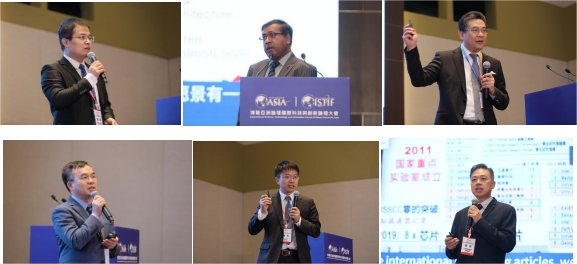5G, which breeds the scientific and technological revolution of the era of disruption, is a major strategic choice for the recreation of regional innovation advantages and the improvement of regional innovation capacity. With the continuous,popularization of 5G communication, it will bring new development opportunities to IoT, AI and other fields. Seizing the 5G opportunity and accelerating the industrialization process will open up unlimited space for innovative development.
The session “Impetus for Innovation - 5G Revolutionizes Science and Technology” was moderated by Hu Guoqing, 5G Research Group Leader of Peking University Shenzhen Institute, and Masudur Rahman, Deputy Chief of Mission and Minister of the Embassy of Bangladesh, delivered a speech in the session. On-site speakers include Allen Yeung, Former CIO of HKSAR Government; He Jin, Chairman of Peking University Shenzhen SoC Key Lab; Deng Lincoln, President of Sally, Inc; U Seng Pan, Deputy Director, State Key Laboratory of Analog & Mixed-Signal VLSI, University of Macau; and Hu Guoqing, 5G Research Group Leader of Peking University Shenzhen Institute. Video and online speakers include Eddie Ng Hak Nin, Former Secretary for Education HKSAR; Tam Wai Ho, Partner of Hong Kong INNO Angel Fund; Sunny Wong, Founder and Chairman of Doctors Think Tank Academy; and Yvonne Zhou, BCG Managing Director & Senior Partner. During the conference, the panelists completed their keynote speeches and discussions on the impact of 5G innovation and technology on life, industry, society and economy.
In this session, the panelists showed the audience the interactive relationship between 5G and industry: 5G can drive the old industry revolution to stimulate the birth of new industries, and the industry can also drive the development and application of 5G technology by feeding back the needs of producers and consumers. Allen Yeung proposed that in the 5G era, the utilization rate of equipment can be greatly improved, thus reducing the error rate of decision-making and waste of resources. For example, with the help of 5G, people can build a smart city, and through 5G's ultra-strong computing and faster instant feedback, it can make use of the city's resources and improve the city's capacity. In addition, the rapid increase of 5G demand stimulates the development of hardware. He Jin also shared the theme of how to improve the quality of 5G equipment such as chips and devices during the session, showing the audience the latest research on chips in the 5G era. On the other hand, Deng Lincoln supposed that there is also technologies in the original industry applicable to the 5G era, and he showed the audience the powerful ability of IPU (Instant Processing Unit) in processing data instantly, which will amplify the advantages in the integration of 5G with the economy and society, enrich the ecosystem of 5G terminal applications, and realize the true Internet of Everything.
The great effect on industrial upgrading under the new 5G technology will be reflected in all areas of people's livelihood in the future, but at present we are still facing a lot of problems. Therefore, panelists suggested that promoting 5G applications, improving 5G utilization and accelerating the construction of the 5G industrial ecosystem will be an important step to rapidly enter the future digital era.

